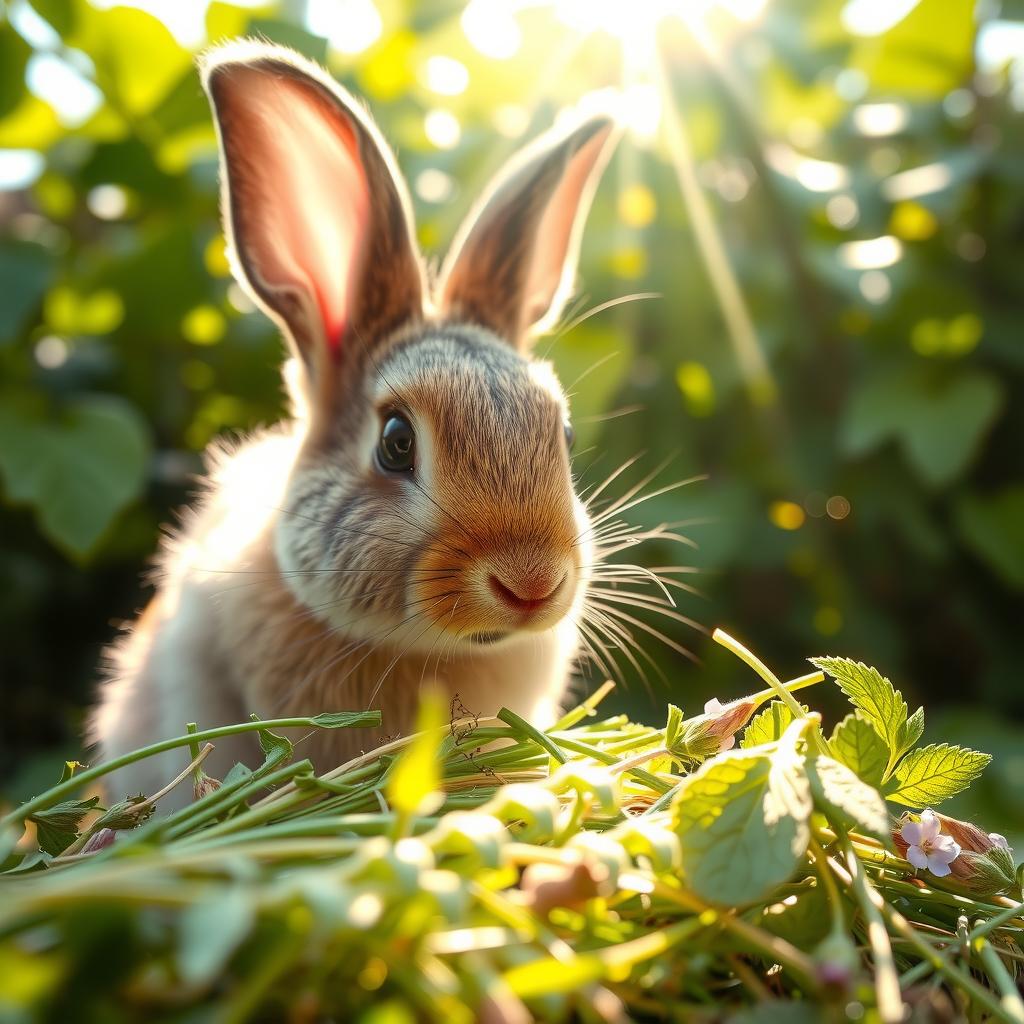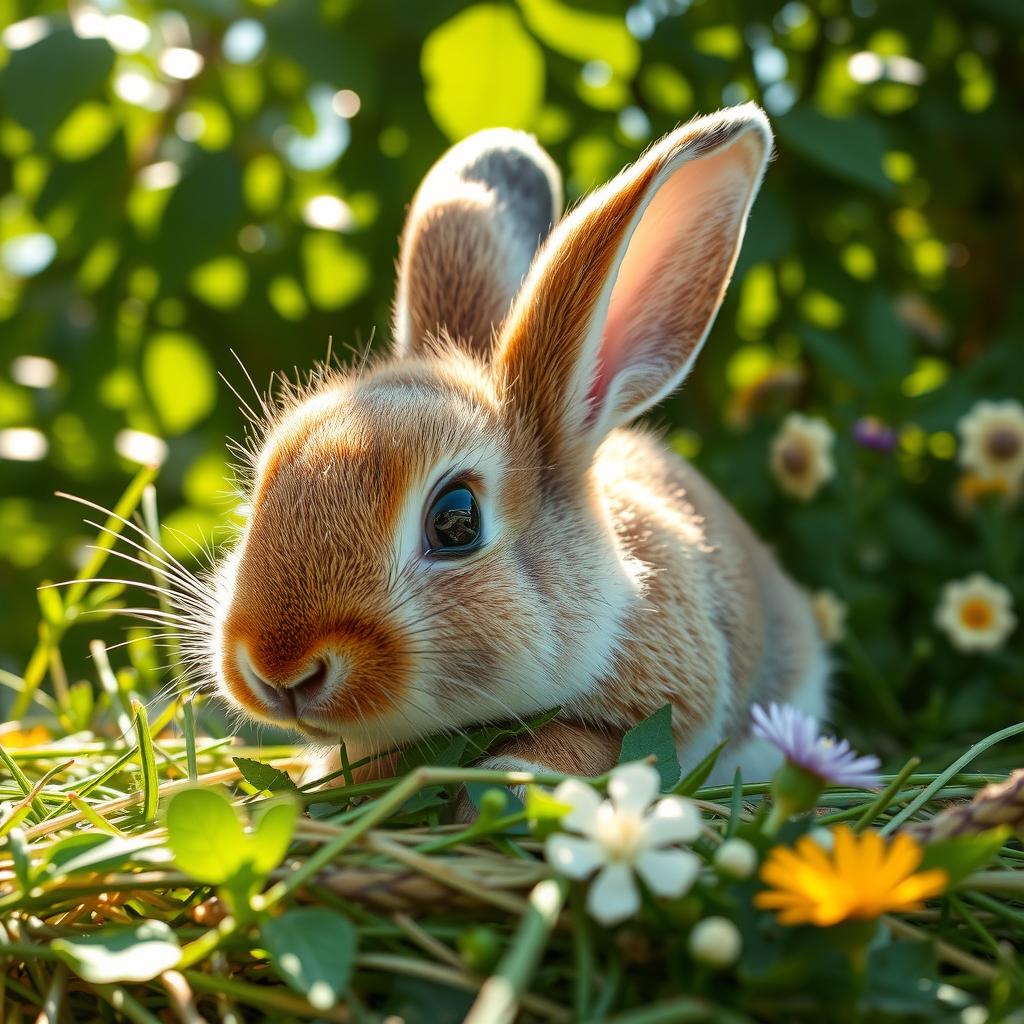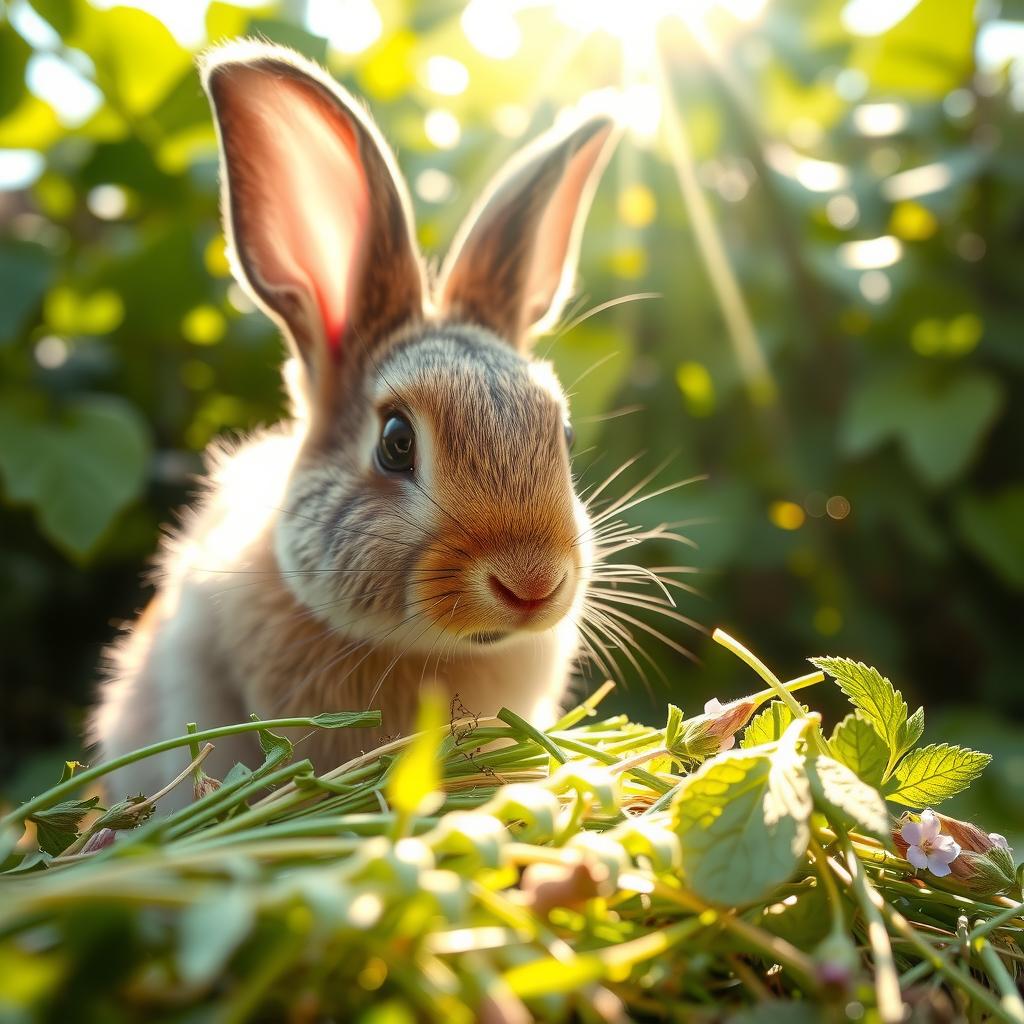When it comes to caring for baby rabbits, pet owners often find themselves grappling with a myriad of dietary options. What if there was one forage option that stood out as not only beneficial but also essential for their growth and development? Enter organic alfalfa hay—a staple in the diets of young bunnies that offers an array of health benefits while meeting their specific nutritional needs. Many rabbit caretakers might wonder how this particular type of hay could enhance their furry companions’ well-being and contribute to a healthy diet.
The significance of selecting the right feed cannot be overstated; it’s paramount for ensuring baby rabbits flourish during their formative months. Organic alfalfa hay emerges as a top contender, rich in protein and calcium, making it an ideal choice for nurturing growing bunnies. Unlike conventional hays, which may lack crucial nutrients, organic variants are cultivated without harmful chemicals or pesticides, providing peace of mind to conscientious pet owners who prioritize quality in rabbit care.
Moreover, understanding what constitutes optimal nutrition can be overwhelming amidst various available options. While many may consider other types of forage or pellets suitable for adult rabbits, they must recognize that baby rabbits have unique dietary requirements that differ significantly from those of fully-grown counterparts. Incorporating organic alfalfa hay into their daily intake ensures these little ones receive adequate energy levels necessary for play and exploration while supporting strong bone development through its high mineral content.
As we delve deeper into the world of bunny nutrition throughout this article, readers will discover why organic alfalfa hay is more than just another feed option—it is an integral part of fostering robust health among young rabbits. By exploring effective ways to incorporate this nutrient-dense forage into your baby’s diet alongside other healthy feeding practices such as proper portioning and mixing with grass hays over time will empower caregivers to make informed decisions about what goes on their pets’ plates.
Join us on this journey toward enhancing your knowledge about rabbit care by uncovering how you can provide your beloved pets with a balanced diet featuring organic alfalfa hay, setting them up for a lifetime filled with vitality and happiness!

Key points:
-
Nutritional Benefits of Organic Alfalfa Hay: This high-quality forage option offers essential nutrients, including protein and calcium, vital for the growth and development of baby rabbits.
-
Importance of Fiber in Rabbit Diets: The inclusion of organic alfalfa hay provides necessary fiber that supports digestive health in young bunnies, ensuring they thrive during their critical growth stages.
-
Commitment to Quality Care: By prioritizing organic feed like alfalfa hay, pet owners demonstrate a dedication to maintaining optimal rabbit care standards that contribute to the overall well-being and happiness of their furry companions.
In understanding the nutritional landscape for baby rabbits, it is crucial to highlight how significant a role high-quality nutrition plays in their early lives. Among various options available within rabbit care practices, organic alfalfa hay emerges as an exceptional choice due to its nutrient density. It contains ample amounts of protein and calcium which are fundamental for supporting robust growth patterns in young furballs.
Moreover, addressing the importance of fiber cannot be overstated when discussing what constitutes a healthy diet for growing rabbits. The soft texture and appealing aroma of organic alfalfa hay make it not only an appetizing addition but also an excellent source rich in dietary fiber. This aspect is particularly vital as adequate fiber intake promotes effective digestion and prevents gastrointestinal issues common among juvenile rabbits.
As responsible pet caregivers explore diverse forage options suitable for baby bunnies, they will find that integrating organic alfalfa hay into daily meals reflects a commitment to quality pet nutrition. Such choices extend beyond mere feeding; they resonate with principles surrounding overall health management within rabbit care routines. A well-balanced diet featuring this nutritious grass can lead to happier pets who exhibit vibrant energy levels while developing good eating habits from a young age.
Furthermore, practical strategies exist for incorporating organic alfalfa hay alongside other wholesome foods tailored specifically toward infantile rabbit diets. For instance, combining this organic feed with fresh vegetables can enhance both nutritional value and variety—making mealtime exciting while ensuring comprehensive nourishment is achieved effectively.
Ultimately, enlightened decisions regarding what fills bunny bowls lay down the foundation for healthier lifestyle choices moving forward—significantly impacting both physical wellness and emotional bonds between owner and pet through shared goals centered around holistic feeding practices focused on healthy diets.

Understanding the Dietary Needs of Baby Rabbits
The Importance of Fiber in Rabbit Nutrition
Baby rabbits, or kits, have unique nutritional needs that are crucial for their growth and development. A healthy diet for these young bunnies is foundational to their digestive health and overall well-being. One of the most critical components of a baby rabbit’s diet is fiber, which plays a vital role in ensuring proper digestion and preventing gastrointestinal issues. In particular, organic alfalfa hay serves as an excellent source of fiber that not only aids digestion but also provides essential nutrients necessary for young rabbits. This type of hay is rich in protein and calcium while being easily digestible—making it an ideal choice during the early stages of life when rapid growth occurs.
Essential Nutrients for Growing Kits
In addition to fiber from organic alfalfa hay, baby rabbits require various vitamins and minerals to support their developing bodies. These include calcium for strong bone formation and phosphorus for energy metabolism. It’s important to strike a balance; while alfalfa hay offers high levels of these nutrients, overconsumption can lead to obesity or urinary problems later on if transitioned too early into adult diets primarily composed of grass hays like timothy or orchard grass. Therefore, introducing diverse forage options gradually allows owners to tailor nutrition according to each rabbit’s specific developmental stage without overwhelming them with unsuitable food types.
Transitioning from Milk to Solid Food
As they wean off mother’s milk around six weeks old, kits should be introduced carefully into solid foods alongside free access to organic alfalfa hay which promotes healthy gut flora through its fibrous content. Initially mixing small amounts with other safe vegetables helps ease this transition by familiarizing them with new textures while still providing necessary nutrients found within high-quality organic feed products tailored specifically for young rabbits. During this period, it becomes paramount that caregivers monitor weight gain closely as any fluctuations could indicate dietary imbalances needing immediate attention.
Balancing Diets Beyond Hay
While organic alfalfa hay forms the backbone of baby rabbit diets due its physical structure aiding optimal dental wear through chewing activities; it shouldn’t be viewed as standalone nourishment option forevermore! Integrating fresh leafy greens such kale and romaine lettuce alongside limited pellets designed specifically for growing bunnies rounds out meals effectively promoting variety without compromising core nutritional values essential throughout different phases within their lives leading toward adulthood maturity where lower-calcium alternatives become more appropriate choices moving forward!
Conclusion: Long-term Health Through Proper Care
Ultimately focusing on establishing sound feeding practices rooted firmly upon principles surrounding fiber-rich sources like organic alfalfa hay, balanced nutrient intake across all categories ensures longevity among pet companions who rely heavily upon responsible owner guidance regarding what comprises suitable fare suited explicitly towards nourishing tiny tummies yearning sustenance! By prioritizing awareness about specific requirements inherent during formative years coupled alongside gradual adaptations made over time leads directly toward fostering thriving lifestyles capable enduring bonds between humans animals alike flourishing together harmoniously bonding tightly woven fabric shared experiences formed along way nurturing love trust mutual respect earned consistently day after day step step journey altogether remarkable shared adventures unfold beautifully unfolding wondrous moments cherished fondly lasting memories created treasured indefinitely hearts intertwined forevermore blissful companionship resembled so strongly fragile yet undeniably powerful connection forged unbreakable bond built shared understanding caring thoughtfully lovingly nurtured endlessly cherished!
The Nutritional Superiority of Organic Alfalfa Hay for Young Bunnies
When it comes to selecting the best forage options for growing rabbits, organic alfalfa hay emerges as a top contender. This exceptional feed is not only rich in essential nutrients but also plays a significant role in fostering healthy growth and development in baby rabbits. Unlike conventional hays, organic alfalfa hay is cultivated without synthetic pesticides or fertilizers, ensuring that young bunnies receive pure nutrition free from harmful chemicals. The high protein content found in this organic feed supports muscle development and overall vitality, making it an ideal choice during the critical stages of a rabbit’s early life.
In addition to its protein benefits, organic alfalfa hay boasts an impressive calcium concentration which is vital for bone health—a crucial factor for young rabbits who are still growing. Calcium aids in the formation of strong skeletal structures; thus, integrating this nutrient-rich forage into their diet can significantly enhance their physical well-being. Rabbit care experts often recommend providing baby rabbits with access to ample amounts of organic alfalfa hay, especially during weaning when they transition from mother’s milk to solid foods.
Moreover, feeding young bunnies organic alfalfa hay encourages natural chewing behaviors that help wear down their ever-growing teeth while promoting good dental health. A proper diet rich in fiber ensures that digestion operates smoothly—an important aspect considering how sensitive rabbit digestive systems can be. It is essential for pet owners and caretakers to understand that including this type of organic feed not only contributes to a healthy diet but also fosters behavioral enrichment by allowing these intelligent creatures to engage with their food naturally.
For those committed to optimal pet nutrition practices, incorporating organic alfalfa hay into a bunny’s daily intake proves beneficial on multiple fronts: physically through nutrient density and behaviorally via chewing activities that stimulate mental engagement. As more individuals recognize the importance of quality dietary choices for pets, organic alfalfa hay’s superiority over other forage options becomes increasingly evident. Notably, many rabbit enthusiasts have observed enhanced energy levels and playful dispositions among their young charges after introducing this nutritious choice into their meals.
In conclusion, choosing organic alfalfa hay as part of your young bunny’s diet offers numerous advantages, marking it as an indispensable component of effective rabbit care strategies aimed at achieving robust growth and vibrant health outcomes. By prioritizing such organic feeds over standard alternatives filled with additives or preservatives, caregivers can ensure they are nurturing happy and thriving little companions prepared for all life’s adventures ahead.
Enhancing Your Rabbit’s Nutrition with Organic Hay
Discover the Benefits of Integrating Organic Alfalfa Hay
Incorporating organic alfalfa hay into a rabbit’s diet is an effective strategy for pet owners looking to enhance their furry friend’s nutrition. This high-fiber forage option serves as a staple in a rabbit’s daily meals, promoting healthy digestion and providing essential nutrients that contribute to overall well-being. When introducing organic hay, it’s important to gradually integrate it alongside other nutritious elements like fresh vegetables and pellets. A balanced combination ensures that baby rabbits receive all necessary vitamins while preventing dietary issues commonly associated with abrupt changes. The fibrous texture of organic alfalfa hay not only encourages chewing—essential for dental health—but also helps maintain gut motility, which is vital for preventing gastrointestinal stasis.
Crafting a Balanced Meal Plan
Creating an optimal meal plan involves understanding each component’s role in your rabbit’s diet. Pet owners should consider using organic alfalfa hay as the primary source of fiber while incorporating leafy greens such as kale or romaine lettuce for added hydration and variety. Additionally, small portions of high-quality pellets can be included to provide concentrated nutrients without overwhelming young rabbits’ digestive systems. It’s advisable to introduce new foods slowly; thus, mixing small amounts of organic alfalfa hay with familiar items can ease this transition effectively. Furthermore, maintaining proper portion sizes is crucial: adult rabbits generally require more mature grass hays like timothy or meadow hay rather than solely relying on nutrient-rich alfalfa due to its higher protein content.
Monitoring Digestive Health
Monitoring how your rabbit responds after integrating organic alfalfa hay into their diet is essential for ensuring long-term health benefits. Observing signs such as stool consistency and energy levels can help assess whether they are thriving on this new addition or if adjustments need to be made in their feeding regimen. If any adverse reactions occur—such as diarrhea or significant changes in appetite—it may indicate overfeeding or sensitivity towards certain ingredients within the mix. In such cases, consulting with a veterinarian specializing in exotic animals can provide tailored insights into improving your pet’s nutrition further while discussing alternatives if needed within the realm of organic feed options available today.
By thoughtfully incorporating organic alfalfa hay, pet owners support their rabbits’ nutritional needs effectively while fostering healthy eating habits that will benefit them throughout their lives.
The delicate balance of a healthy diet for baby rabbits is essential for their growth and overall well-being. One standout option that pet owners should consider is organic alfalfa hay. This nutrient-rich forage not only appeals to young bunnies with its soft texture and sweet aroma but also plays a vital role in supporting their developmental needs. High in protein and calcium, organic alfalfa hay serves as an excellent complement to other dietary elements, ensuring that baby rabbits receive the necessary nutrition from an early age.
Incorporating organic alfalfa hay into the diets of these adorable companions reflects a commitment to quality rabbit care. The rich fiber content promotes healthy digestion, which is especially crucial for growing bunnies who are still developing their digestive systems. Unlike commercial feeds that may contain additives or fillers, opting for organic feed like organic alfalfa hay guarantees that pet owners provide wholesome nutrition free from harmful substances. This choice not only fosters robust growth patterns but also sets the groundwork for good eating habits throughout the rabbits’ lives.
When it comes to exploring various forage options available for baby rabbits, many caregivers may overlook the advantages of feeding them high-quality hays such as organic alfalfa hay. By prioritizing this nutritious food source within their pets’ daily meals, rabbit owners can ensure optimal health outcomes while enhancing the bond between themselves and their furry friends through shared wellness goals centered around proper pet nutrition. Ultimately, making informed decisions about what goes into bunny bowls elevates standard practices within rabbit care.
FAQ:
Q: What benefits does organic alfalfa hay offer to baby rabbits?
A: Organic alfalfa hay provides essential nutrients such as protein and calcium while promoting healthy digestion through its high fiber content.
Q: Can I mix organic alfalfa hay with other foods?
A: Yes! It’s beneficial to incorporate organic alfalfa hay alongside other nutritious elements like fresh vegetables or pellets tailored specifically for rabbit care.
Q: How do I know if my baby rabbit is getting enough nutrients?
A: Observing your bunny’s energy levels, coat condition, and overall behavior can indicate whether they are receiving adequate nutrition from a balanced diet including offerings like organic feed such as organic alfalfa hay.

